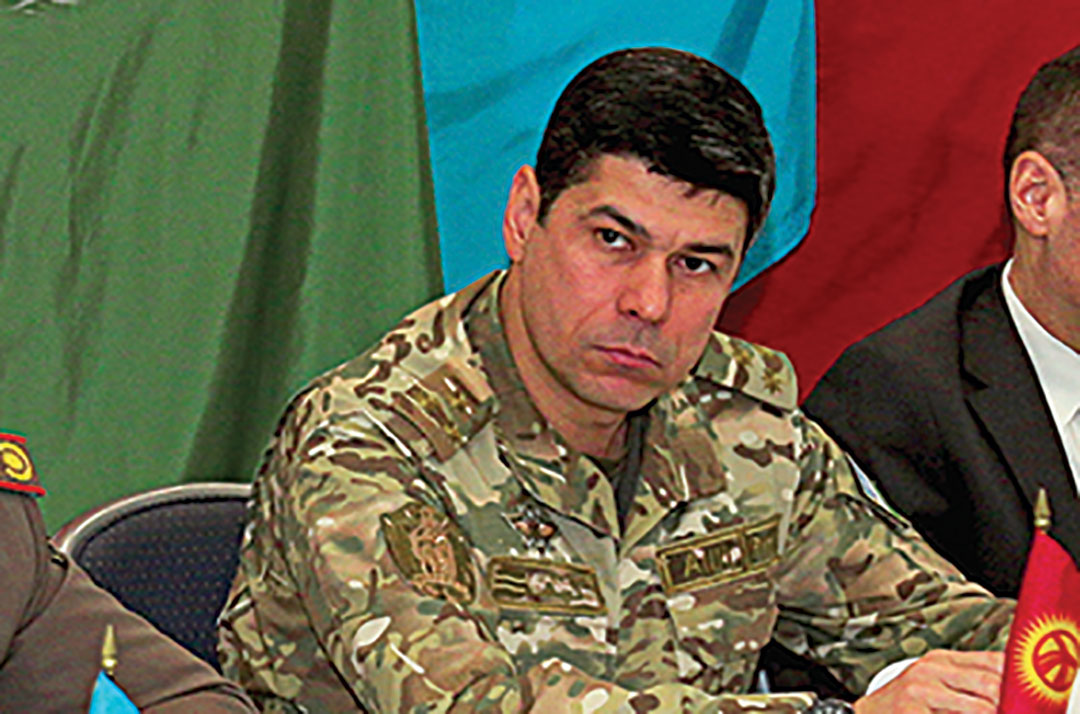The country’s Armed Forces updates its military doctrine to address hybrid warfare
COL. OLIMJON SAMATOV, HEAD OF MILITARY INTELLIGENCE, UZBEKISTAN ARMED FORCES GENERAL STAFF
Lt. Col. Umed Ahmedov, Uzbekistan Senior National Representative to U.S. Central Command
Regional and global security experts suggest that hybrid operations constitute the foundation of modern geopolitical rivalry. Hybrid warfare is a strategy that seeks to wear down a nation without the direct confrontation of traditional, conventional warfare. A wide range of instruments are used to pursue this objective.
They include regular military units and irregular forces. There are also activities carried out within the framework of the integrated operation concept and planning that are aimed at not only the disruption of a nation’s administration, policy, finance, economy and culture, but also the erosion of its military security. The convergence of these instruments constitutes the key difference of hybrid warfare from its traditional counterpart.
Since war is often defined as a continuation of politics by other, force-based means, politics itself can be viewed as a key instrument of hybrid warfare. Hybrid warfare is an all-encompassing endeavor waged against every vital area at the heart of the targeted nation’s functioning. Its goal is depriving the targeted nation of its sovereignty without overt seizure of territory.

There are three principal objectives that must be achieved to guarantee victory in a war: destruction of enemy forces, elimination of its economic capacity, and deposition of its government and replacing it with loyal supporters. This victory formula is applicable to any war in the past, present or future. However, in terms of the hybrid warfare it is the last two objectives that are of great importance.
Hybrid operations can be defined as sets of events and actions — coordinated in terms of goals and objectives — aimed at exerting influence upon a nation without a direct application of regular forces. The most important advantage offered by hybrid operations is the aggressor nation’s ability to deny its involvement in any ongoing events and to reach its goal with little threat of military retaliation or international condemnation. Moreover, the majority of hybrid warfare forms and approaches do not directly violate international law:
- Information operations: conducted against state administrative bodies and command and control units of the enemy to misguide and mislead them, to disrupt information exchange and to encourage decision-making favorable to the party conducting the operations.
- Psychological operations: conducted against the morale of the enemy’s population and its armed forces to spread distrust and provoke destructive actions.
- Cyber attacks: conducted against national and commercial vital infrastructure aimed at their disruption and gaining unauthorized access to sensitive information.
- Economic influence: embodied through various forms of economic embargos, cessation of investments, disruption of energy supplies and goods exchange in those nations impeding the goals pursued by hybrid operations.
- Stoking social-grievance-fueled protests: conducted through various protest actions of opposition forces, destructive actions of influencers acting as moles in local government agencies and supporting regional self-determination movements.
- Proxy-enabled armed attacks and acts of sabotage: carried out by separatists and terrorists, as well as by specialized military units wearing unmarked uniforms.
All of the mentioned forms and approaches to hybrid warfare are applied in the most destructive way against weaknesses of the targeted nation. Those weaknesses include history, law, geostrategic factors, technology, vital infrastructure security, the degree of social polarization, and ethnicity- and religious-based peculiarities. We must also keep in mind the geopolitical position of a nation, its position within military and political blocs, and its proximity to conflict zones.
In 2018, the Republic of Uzbekistan, taking into account the aforementioned facts as well as the friendship- and peace-based nature of its foreign policy, adopted a defense doctrine that provides for national security against various threats, including the hybrid variety.
Among the principal peculiarities of modern military conflicts, as stated in the doctrine, are:
- Preliminary informational-psychological influence aimed at establishing political motivation and international public opinion for the necessity of using of military force to settle the dispute.
- Vigorous employment (alongside conventional military forces) of numerous nonmilitary means (political, economic, informational-psychological and others).
- Active involvement of special operations forces, illegal armed formations, private military companies and other mercenaries employing sabotage and terrorist combat means.
- High probability of swift transformation of one form of military conflict to another.
- Uzbekistan in general and its Armed Forces in particular, under the guidance of their Supreme Commander-in-Chief President Shavkat Mirziyoyev, have been implementing a number of measures aimed at neutralizing potential threats and subsequent localization of hybrid weaknesses (both real and hypothetical). The Armed Forces of Uzbekistan have:
- enhanced analytical capabilities in intelligence and operation units of security agencies, which would detect various threats and challenges at the earliest level to take preventive measures.
- promoted training and effective use of counterterrorist and countersabotage units.
- developed military and industrial capabilities to achieve self-sufficiency.
- carried out military research and used effective technological and software products to protect command-and-control systems and databases.
- augmented the security of vital state property, communication hubs, infrastructure facilities and other potential targets against acts of terror and sabotage;
- Strengthened the information-psychological immunity of all troops, reducing the risk that propaganda would spread destructive ideas among military personnel.worked toward improving the image of the national Army among Uzbekistan’s population, especially its youth, and established a curriculum of military-patriotic education for young people at all the stages of schooling.
Uzbekistan is building upon a democratic foundation of national governance and implementing internal policy measures aimed at improving its welfare system, providing support for young people, strengthening interethnic concord and religious tolerance, and enhancing civil society organizations and mass media.
We have gradually implemented measures to develop and liberalize the economy and diversify industry and agriculture. The aim is to strengthen macroeconomic stability and preserve high rates of economic growth.
Taking into account that foreign policy plays as important a role in a nation’s defense against hybrid threats as its domestic counterpart, Uzbekistan has been conducting an open, mutually beneficial, constructive and pragmatic foreign policy.
The cornerstone of our foreign policy is our adherence to nonparticipation in any military-political blocs, prohibiting deployment on national territory of foreign military bases and units, tolerance for using the Armed Forces in peace-support operations abroad, and peaceful resolution of disputes and conflicts. Preserving its nonaligned status, Uzbekistan is open to dialogue and wants to expand cooperation with all its partners in the name of peace.
Our main foreign policy priority is Central Asia. Our policy in the region aims to provide peace and stability, enhance friendship- and trust-based relations with our neighbors, and contribute to the resolution of key regional security issues such as the conflict in Afghanistan.
In conclusion, I would like to express my firmest belief that versatile and mutually beneficial cooperation of military intelligence agencies will significantly enhance the security of our nations against modern threats and challenges, including those of a hybrid nature.

